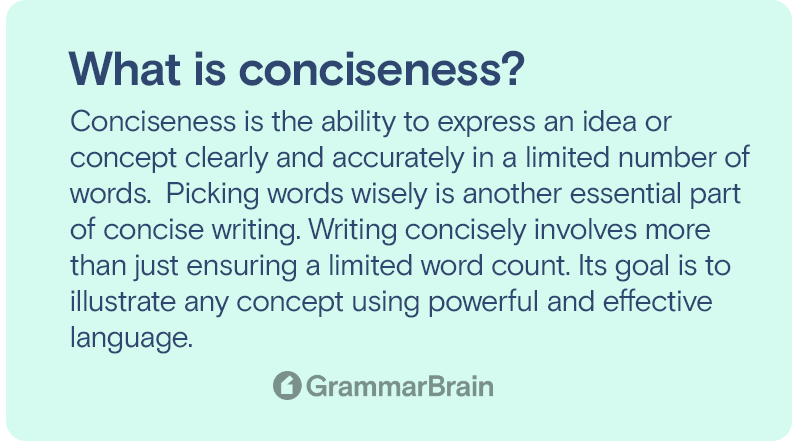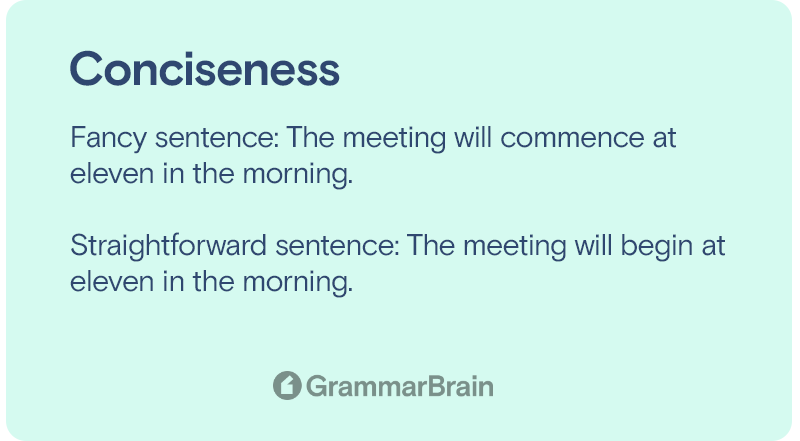Conciseness is the ability to express an idea or concept clearly and accurately in a limited number of words. Picking words wisely is another essential part of concise writing. Writing concisely involves more than just ensuring a limited word count. Its goal is to illustrate any concept using powerful and effective language.
Writing and conciseness
It is very easy to develop the habit of wordiness. Many authors write in the same manner as they talk, using redundant words and filler phrases.
Though the sentences may sound natural while writing, using too many words can make it difficult for the reader to understand the concept explained in the text.
Sentences with repetitive, pointless, and filler words are changed or eliminated in concise writing. Writers use several strategies to improve their writing to make it more succinct. Some of them include:

Use straightforward language and avoid pointless “fancy” words
Sometimes authors use fancy or rarely used words and rely too much on the thesaurus to make their text look elegant. But this will reduce the overall clarity of the text. Smart and careful readers will easily spot these unnecessary words, affecting the credibility of the writer.
Example:
Fancy sentence: The meeting will commence at eleven in the morning.
Straightforward sentence: The meeting will begin at eleven in the morning.
Substitute commonly used words or phrases
Write more succinctly by swapping out overused and long phrases with meaningful words.
Example:
Unconcise sentence: Mary cannot come to the Halloween party due to the reason that she is afraid of spiders.
Concise sentence: Mary cannot come to the Halloween party because she is afraid of spiders.
Avoid passive voice
Sentences in active voices are better at conveying the meaning to the reader. Also, sentences using passive voice need more words and look less appealing.
Example:
Active voice: Lily ate the strawberry ice cream.
Passive voice: The strawberry ice cream was eaten by Lily.
Avoid redundant pairs
Some common expressions combine two words with comparable meanings. Use only the stronger word in the redundant pair and eliminate the weaker one.
Example:
With redundant pair: The government has introduced a plan to make cities and villages interdependent on each other.
Without redundant pair: The government has introduced a plan to make cities and villages interdependent.

Use intensifiers and qualifiers judiciously
Qualifiers are used to either increase or decrease the impact of another word. The issue with qualifiers is that sometimes they can lessen a word’s intensity and make the text seem ambiguous, damaging the credibility of the author.
Example:
With qualifiers: May in Addis Ababa is really hot.
Without qualifiers: May in Addis Ababa is scorching.
There are some cases where a qualifier may be indispensable to the sentence. For instance, in the sentence “It will probably snow today,” the qualifier “probably” is necessary. It shows that it may or may not snow on the specified day.
Use positive constructions
When ideas are expressed negatively, more words have to be used. Also, it makes sentences convoluted and difficult to understand.
Example:
Negative construction: Anna will not eat rice that has no salt.
Positive construction: Anna will eat rice with salt.
FAQs
Is it necessary to follow conciseness all the time?
This mainly depends on the author. Though in most cases, it is preferable to be concise, this rule can be broken sometimes. Authors, specifically fiction authors, sometimes use long-winded sentences, often with the aim of attracting the attention of the reader to the said sentence.
Why is it important to write concisely?
Sources:
- Merriam Webster – conciseness : definition
- Wiktionary – conciseness
- Grammarly – What Is Conciseness?
- MasterClass – 7 Tips for Clear and Concise Writing
Inside this article
Fact checked:
Content is rigorously reviewed by a team of qualified and experienced fact checkers. Fact checkers review articles for factual accuracy, relevance, and timeliness. Learn more.
Core lessons
Glossary
- Abstract Noun
- Accusative Case
- Anecdote
- Antonym
- Active Sentence
- Adverb
- Adjective
- Allegory
- Alliteration
- Adjective Clause
- Adjective Phrase
- Ampersand
- Anastrophe
- Adverbial Clause
- Appositive Phrase
- Clause
- Compound Adjective
- Complex Sentence
- Compound Words
- Compound Predicate
- Common Noun
- Comparative Adjective
- Comparative and Superlative
- Compound Noun
- Compound Subject
- Compound Sentence
- Copular Verb
- Collective Noun
- Colloquialism
- Conciseness
- Consonance
- Conditional
- Concrete Noun
- Conjunction
- Conjugation
- Conditional Sentence
- Comma Splice
- Correlative Conjunction
- Coordinating Conjunction
- Coordinate Adjective
- Cumulative Adjective
- Dative Case
- Determiner
- Declarative Sentence
- Declarative Statement
- Direct Object Pronoun
- Direct Object
- Diction
- Diphthong
- Dangling Modifier
- Demonstrative Pronoun
- Demonstrative Adjective
- Direct Characterization
- Definite Article
- Doublespeak
- False Dilemma Fallacy
- Future Perfect Progressive
- Future Simple
- Future Perfect Continuous
- Future Perfect
- First Conditional
- Irregular Adjective
- Irregular Verb
- Imperative Sentence
- Indefinite Article
- Intransitive Verb
- Introductory Phrase
- Indefinite Pronoun
- Indirect Characterization
- Interrogative Sentence
- Intensive Pronoun
- Inanimate Object
- Indefinite Tense
- Infinitive Phrase
- Interjection
- Intensifier
- Infinitive
- Indicative Mood
- Participle
- Parallelism
- Prepositional Phrase
- Past Simple Tense
- Past Continuous Tense
- Past Perfect Tense
- Past Progressive Tense
- Present Simple Tense
- Present Perfect Tense
- Personal Pronoun
- Personification
- Persuasive Writing
- Parallel Structure
- Phrasal Verb
- Predicate Adjective
- Predicate Nominative
- Phonetic Language
- Plural Noun
- Punctuation
- Punctuation Marks
- Preposition
- Preposition of Place
- Parts of Speech
- Possessive Adjective
- Possessive Determiner
- Possessive Case
- Possessive Noun
- Proper Adjective
- Proper Noun
- Present Participle
- Prefix
- Predicate



